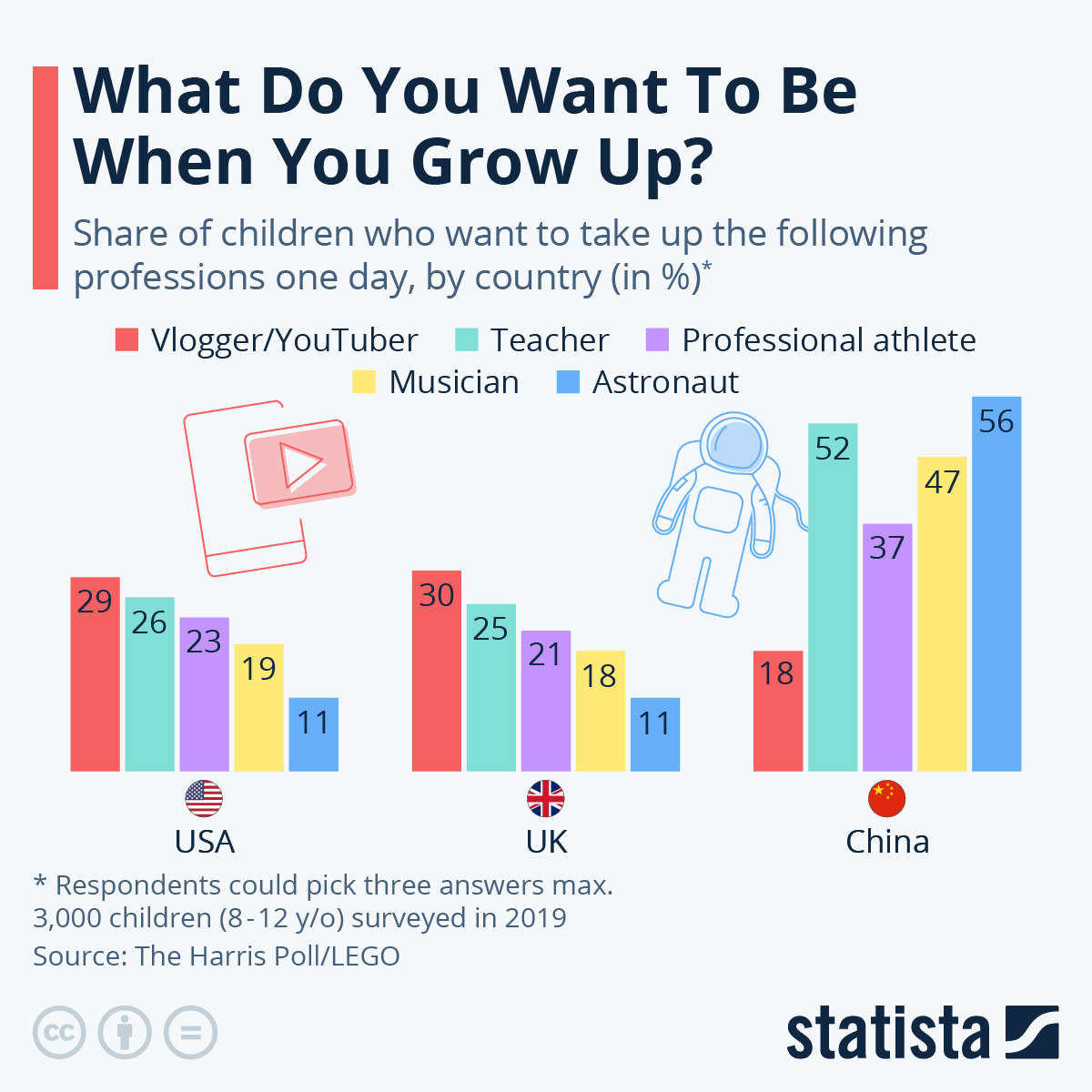you really don’t wanna see the survey where they asked how many of them wanna be Andrew Tate
I’m not optimistic about the future
While the exact reason for the difference in aspirations is unknown…
The difference is that China has industries, the US has only military industries, and the UK has… TERFs? And one factor that isn’t mentioned is the fact that adults apparently give children quizzes where ‘vlogger’ is a career path; that’s going to make children think that vlogger is a career path for the same reason that poor kids soon forget about wanting to be accountants, lawyers, architects, doctors—they know which jobs are and aren’t options because adults make it clear.
Someone with better mathematics will have to confirm this but the charts are skewed, too. So it’s worse than it seems at first glance. Children could choose up to three, right? The Chinese one really emphasises this, being well over 100%. The fact that the US/UK one is a slope suggests that practically every child chose vlogger, some only vlogger or only two options, with a few willing to choose three. In China, though? Every child chose three and a smaller fraction chose vlogger as an afterthought or maybe as a way of sharing knowledge from/about their primary choice. A handful likely put vlogger as number one, still.
I’d argue that there’s also an aspect of collectivism vs individualism at play here. In China, people see advancing their country as a collective effort. People want to become part of something bigger than themselves. There’s an aspect of inspiration when you see your society achieve great things, and you naturally want to be part of that. So, kids grow up wanting to become an astronaut or an engineer. On the other hand, when you live in a hyper-individualistic culture where personal achievement is seen as peak success, there’s really nothing greater to strive for than being rich and famous. Thus, kids want to become influencers, because that’s seen as a path towards success that society encourages.
See this, with Israel, this is like collective cuckoldery. It’s like we’re all collectively, as Americans, sitting and watching our wife get fucked, and going, well, you can do it better than me anyway, so it’s all good. Motherfuckers in Israel got universal health care, they got a child care stipend, you know, the same one that they repealed for us not too long ago, yeah, they got that, they got free college, you know, all types of stuff that we are always told we can’t afford. So these people would rather their, rather Israel’s kids have a future than America’s kids. You ain’t gotta be a communist to think that that’s fucked up. You ain’t gotta be a socialist to go, hey, why do you want, why do you want the bull’s kids to have a future, but not your own kids, you fucking cuck?
30k to give birth in America, Free in Israel. Our taxes.
The five genders:
Teacher, Astronaut, Professional Athlete, Musician, Vlogger
That’s what the five stars in the Chinese flag mean, dummy
This is a LEGO advertisement, just so everyone is aware. I can’t find info on how the polling worked so it’s unclear how the job options were chosen. But, it doesn’t seem like the kids were allowed to input their own answers—rather there was a list of jobs and respondents were told to pick 3.
There are plenty of reasons to object to the US/UK education systems but maybe people shouldn’t rely on something intended to sell LEGO model rockets. Not to mention, being pessimistic is a choice and begets inaction. We can’t fall victim to nihilism lest we become nothing but annoying gadfly social critics, talking about how obviously right we are as the world ends to climate change and open combat between multinational corporations.
Anyway, this advert is pretty clever. Creating a leading poll to convince parents they need to buy their kids legos to prevent the Chinese from taking over space managed to get them all sorts of free media coverage—not to mention random shares from people like us.







